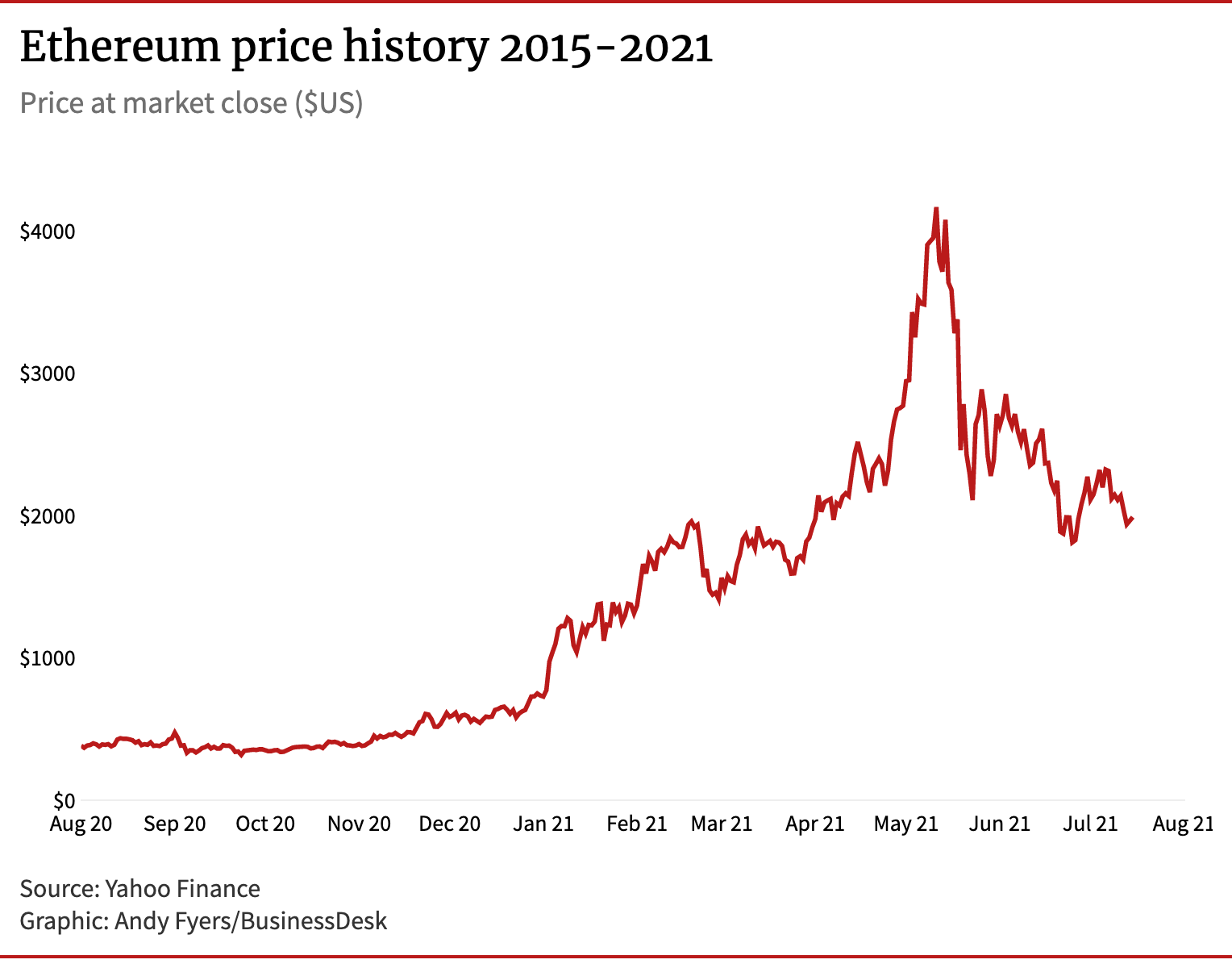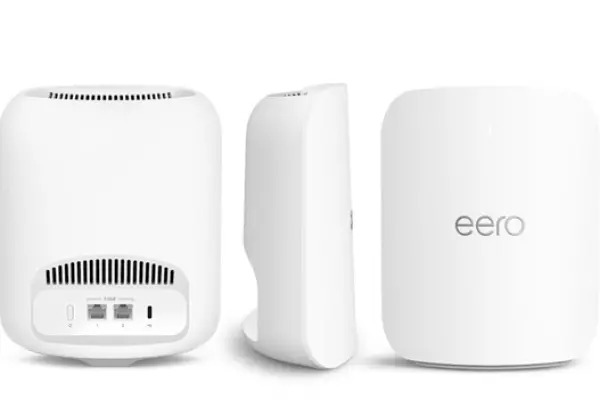I remember exactly where I was when I received the best investment advice I never took.
I was in The Boatshed events venue on Wellington’s waterfront. Suited-up financial types rubbed shoulders with start-up founders wearing t-shirts. The bureaucrats from the Treasury and various government ministries were easy to spot by the lanyards dangling from their necks.
We’d all just heard a series of talks from local and international experts about the Blockchain, a type of decentralised digital ledger of transactions that was set to change how we shopped, banked and signed contracts with each other.
The room was full of evangelists of Ethereum, one of the key emerging technology platforms based on Blockchain technology. But the chat over drinks wasn't about the issues Blockchain would pose for government regulators or how it would take the hassle out of settling real-estate deals. It was about the price of Ether (ETH), the cryptocurrency tied to Ethereum.
That day in May 2016, the price of a single Ether coin was US$12.70. The consensus among the early crypto investors around me was that Ether was the best investment bet now that its key rival, Bitcoin (BTC), was trading at an eye-watering US$537 a coin.
“You’ve missed the boat on Bitcoin,” they told me. “Ether will never be as cheap again.”
They were wrong. In December that year, the price of Ether dropped to US$8.01. Then came the precipitous rise, all the way to $1067 in early 2018, then the spectacular crash in March, followed by the 18-month slump and then, earlier this year, the massive rally to a record high of $2760 in April. Meanwhile, the king of the coins, Bitcoin, hit $58,734 around the same time – yes, for a single coin.

Timing is everything
A month later, as the price drew back a few hundred dollars, I finally made my big move, buying around $6000 of Ether. If I'd done that back in May 2016, my Ethereum holding would have been worth $1.32 million this week. Woulda, coulda, shoulda!
Financial advisers say you should never invest in things you don’t understand. I now know marginally more about Ethereum than I did back then. But I’m one of thousands of Kiwis investing in this new generation of digital tokens as an alternative to term deposits and property.
A Financial Services Council survey of 2000 investors last month found that one in five people were investing in or had previously invested in cryptocurrencies. That’s up 7% since March 2020. Those currently holding cryptocurrency increased from 3% of respondents to 9.5%.
That’s still well below the percentage holding shares (30% owned New Zealand stocks) but younger, tech-savvy investors are hungry for the potentially higher-value gains cryptocurrency offers.
They know prices are volatile. It’s a risky asset class, with many coins not backed by any real-world assets. Sentiment rules a fickle market. A relatively new currency, Dogecoin, has fluctuated in value largely on the basis of tweets posted by billionaire Tesla founder Elon musk, an early enthusiast.
But where else do you put your money when interest rates on cash deposits barely cover the account fees, and property prices are through the roof?
Auckland-based Easy Crypto, the country’s largest cryptocurrency broker, has seen a huge influx of investors since the start of the year in particular. Founded in 2017 at the tail end of the first major cryptocurrency boom, the company has added around 50 staff in the past year to meet demand for its 24/7 trading operation.
Co-founder Janine Grainger set up the company with her brother Alan in response to the high transaction costs local crypto traders faced at the time.
“It’s a fully digital product. It doesn’t have any shipping costs. New Zealanders should be able to buy it at the same cost as the rest of the world,” says Grainger, who started the company as a side hustle while still a strategy manager at Air New Zealand.
That was just as well, because the cryptocurrency bull run ended abruptly in early 2018.
“Everything fell off a cliff,” says Grainger. “Alan was a digital nomad travelling around Southeast Asia and working from whichever hammock he managed to find himself in for the day,” she says.
“So it worked out okay. It gave us time to scale up from a really good foundation to accommodate the next boom.”
Crypto collapse
Then came a particularly savage blow to the New Zealand crypto trading scene – the collapse of Cryptopia, the Christchurch-based cryptocurrency exchange that at one point had 1.4 million investors worldwide.
A hacking attack on the exchange in 2019 siphoned off around $24 million in investor coins sitting in the company’s digital wallets. The firm later collapsed into liquidation. Investors are still trying to claw back their stolen funds.
“It was a terrible situation for people who had funds on the exchange and lost them,” says Grainger. “It was terrible for Cryptopia staff, too.”
She believes the episode seriously dented Kiwis’ appetite for cryptocurrency investing.
“All they’d ever heard about cryptocurrency was about the dark web and Silk Road. Now we had Cryptopia losing people’s money. There was a lot of really negative sentiment around cryptocurrencies.”
 Easy Crypto co-founder Janine Grainger.
Easy Crypto co-founder Janine Grainger.
Easy Crypto chose a different path to Cryptopia, becoming a non-custodial broker. That means it doesn’t hold funds on behalf of investors, so it doesn’t risk a similar devastating attack.
Investors buy and sell via Easy Crypto’s platform, transferring their coins to and from a digital wallet. They alone are responsible for storing their coins safely.
The Graingers initially just sold cryptocurrencies, then moved into buying them as well, a more complicated proposition given our banks’ wariness of cryptocurrency being used by criminals trying to launder money.
“We had to make sure we weren’t taking dodgy cryptocurrency and turning it into nice, clean New Zealand dollars,” says Grainger.
The anonymous and decentralised nature of cryptocurrencies certainly mean they are a beacon for people who want to shuttle funds anonymously around the world. The hackers who crippled the Waikato District Health Board’s computer systems with a ransomware attack in May demanded to be paid in Bitcoin. The DHB refused to pay to have its systems unlocked and took weeks to become operational again.
But the nature of the Blockchain underpinning cryptocurrencies inherently makes them auditable, traceable and remarkably transparent. It’s for that reason investigators were able to see how stolen coins were transferred from one digital wallet to another in the wake of the Cryptopia hack – and recover some of them.
“After I explain this to people in the traditional financial industry, they ask, why would anyone want to use cryptocurrency for crime?” says Grainger.
Not all about Bitcoin
Bitcoin, for a long period, represented 70-80% of what Easy Crypto sold. But that has changed dramatically this year.
“It’s now about 20% of what we turn over, some days as low as 10%,” says Grainger. “The market is moving away from being solidly Bitcoin; there’s a big shift towards alternative coins.”
Those alt coins include the likes of Ethereum, Lite Coin, Stellar and Binance Coin.
Why did I go with Ethereum? Those ideas floated at The Boatshed five years ago are now starting to come together. Ethereum has a large software-developer community building applications based on its Blockchain. Many of them are creating DeFi (decentralised finance) tools that can make contract-based financial transactions faster and more efficient.
It took only a couple of minutes to buy my Ether via Easy Crypto. Within 10 minutes the newly purchased coins were sitting in my digital wallet. Since then, their value has fluctuated up and down by around 15%. But I'm in it for the long haul. I may not have gotten in at rock-bottom prices, but I’m still an early adopter in the scheme of things – if you believe cryptocurrencies have an integral role to play in our future, which I do.
Grainger says only one in 10 transactions via Easy Crypto involves investors selling coins, but the sales represent 50% of the value. That suggests that investors are similarly looking longer term, selling when they’ve seen significant increases in the value of their coins.
Easy Crypto now also operates in Australia, South Africa and Brazil and will launch in the Philippines later this year. Grainger says while the company is growing rapidly, it won’t make the mistakes of Cryptopia, which tried to do too much too quickly and ended up with an insecure platform.
“We’ve had a development freeze for the last six months,” she says. “We’ve been working solely on security, code reviews, external reviews and penetration testing.”
That cautious approach to developing the platform makes sense given that Grainger believes the future of businesses like Easy Crypto is in custodial services, managing and holding crypto on behalf of people who want a simpler way of investing.
“It needs to be done in a way that is really safe and secure, where you have insurance and guarantees,” she says.
Regulatory scrutiny
Parliament’s finance and expenditure select committee this week released the terms of reference for an inquiry into the risks and benefits of cryptocurrencies.
"The fact of the matter is they're an emerging asset and we really don't know quite how they work,” the committee’s chair, Labour MP Duncan Webb, told RNZ.
"A lot of people who are investing in them don't really know what the volatility is."
Tighter regulation could result from the inquiry, mirroring efforts around the world to rein in a system that threatens to overturn traditional ways of doing business, as well as monitoring it.
“There probably isn’t enough regulation,” Grainger admits. “To have mass adoption, people want to know that if something goes wrong, there’s a number they can call.”
That’s fine with me. Mass adoption of Ethereum means my humble investment is destined to grow.
Janine Grainger’s five tips for cryptocurrency investing:
1. Put a small fraction of your wealth into cryptocurrencies
“Diversify your existing wealth into cryptocurrency, so maybe 5-10% of your net assets,” says Grainger.
You should also diversify within the crypto scene – don’t just put all your crypto investment into Bitcoin or Ethereum. There are hundreds of coins to choose from, though a small handful make up the vast majority of trading volumes.
Just as with buying shares in companies, it's worth looking for coin platforms you have an affinity with, based on how they operate, their mission or the inventiveness of their technology.
The bottom line, says Grainger: “Don’t throw your life savings into it, but it is a great way to diversify your asset portfolio.”
2. Look at the total cost of crypto trades
Look at all the things that influence the price you pay, including foreign exchange costs associated with getting New Zealand dollars to overseas cryptocurrency markets.
Don’t get thrown by the “spot price” (the midpoint between the buy and sell rates) of Bitcoin or Ethereum, which is the price you will see when you Google the current price. That is not the price any exchange will sell you the coins for, because it doesn’t include all of the various costs and fees involved in the exchange process.
3. Know how to get in and out of crypto – fast
Consider registering with multiple exchanges or brokers, so if one exchange goes down due to a technical fault or overwhelming demand, you have other options to sell immediately.
“If you want to exit in a bull run and you can’t exit in New Zealand dollars, exit into USD Coin or USD T [Tether] or a stable coin that lets you lock in the exchange rate,” says Grainger.
Stable coins are backed by an equivalent amount of traditional fiat currencies, such as the dollar, the euro, or the yen, which are held in designated bank accounts.
“At least if you can’t get it out to your bank account, you are removed from the volatility of a particular coin,” says Grainger.
4. Don’t lose your private key!
The private key links you to your cryptocurrency, and it is your responsibility to protect that key. If someone else has your private key, they could use it to steal your coins and you might not be able to recover them.
Says Grainger: “You don't want to put your keys anywhere online, so I definitely wouldn’t back them up in your email or Evernote or something like that. I've actually heard stories of people having their applications compromised and losing their cryptocurrency.”
If you do want to keep your key online somewhere really safe, some banks and security software providers offer secure online vaults.
“Personally, I use a secure encrypted online service,” says Grainger. “It's like I have an encrypted file that I can store anywhere in the cloud. You cannot open it without the password and that password I’ve memorised.”
5. For extra security, get a hardware wallet
If you've got more money tied up in crypto than you'd be comfortable losing, you should look at getting a hardware wallet, says Grainger.
That’s a type of cryptocurrency wallet type that stores your private keys in a secure physical device. The cryptocurrencies stored in the wallet are kept offline, meaning that they can't be hacked. A hardware wallet typically costs $220 to $250.
I used the Exodus digital wallet to transfer my Ether after buying it through Easy Crypto before transferring it to a hardware wallet. Easy Crypto recommends Exodus and a few others. Online wallets have their own security built in and you can back up their contents as well.
“But often they are only as safe as the devices they are used on,” Grainger says. “If you get malware or if someone picks up your device, it could be compromised.”















